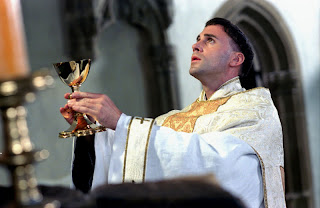I recently re-watched the 2003 biopic Luther starring Joseph Fiennes in the title role. When this picture first came out I had to practically beg my wife and a friend of ours to go see it with me. Apparently, the thought of spending a Saturday afternoon engrossed in the Protestant Reformation appealed to nobody but me.
Catholic Priest Martin Luther celebrates Mass
This was an independent film produced by a Lutheran group. As the Wikipedia article points out, there are many historical inaccuracies and anachronisms in the film. But, hey, after all, this is a movie. Luther provides and entertaining, painless history lesson and that's all that counts.
Joseph Fiennes as Martin Luther posts the 95 Theses
In its' overall outline, the film does accurately depict Martin Luther the monk and his struggle with scruples. As a scripture scholar at the University of Wittenburg, Luther posted his 95 Theses to the door of the castle church. Luther's talking points challenged the right of the Pope and the bishops to sell indulgences which purported to forgive the punishment due for sin in the afterlife.
Former Monk Martin with his wife, former nun Katharina
The acting in the film is excellent. Joseph Fiennes does a fine job of portraying the brilliant but emotionally disturbed Martin Luther. Alfred Molina puts in a great performance as the Dominican indulgence seller, Johann Tetzel. The late Peter Ustinov (1921 - 2004) is convincing as Prince Frederick the Wise of Saxony.
If you want an entertaining movie about the Protestant Reformation, Luther is what you're looking for.




The film also illustrates that Luther and the first "Lutherans" saw themselves as being Roman Catholic REFORMERS. The Reformation - driven by greed and lust for power on the part of some - went far beyond what Luther had intended. Odd to me that Protestants wanted to be Bible-oriented only. Christ founded a church, He didn't write a book, and it was that church, that institution, which collected books together and approved them AS the Bible. The church - and truths embodied in sacred custom and tradition, as well as in Scripture - came first.
ReplyDelete